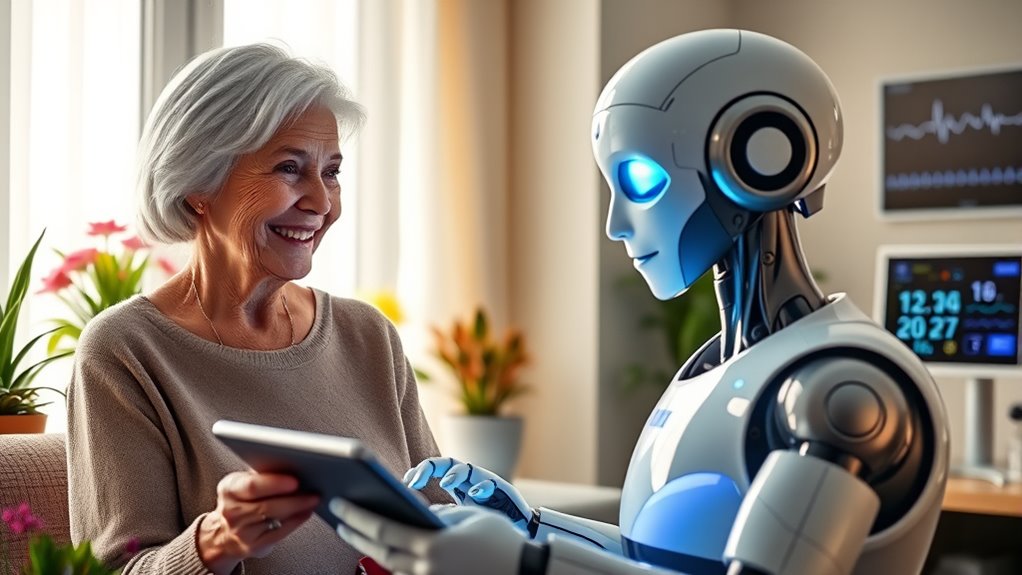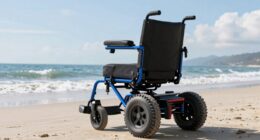AI and machine learning are transforming elder care by enabling personalized health monitoring, improving safety with real-time alerts, and supporting mental well-being through virtual companions and tailored activities. These technologies help detect health risks early, assist with mobility, and promote independence. They also enhance caregiver support and operational efficiency. As innovations continue, you’ll discover how ongoing advancements make aging safer, healthier, and more comfortable for seniors, if you follow along further.
Key Takeaways
- AI enables predictive analytics for early disease detection and personalized care plans for seniors.
- Machine learning analyzes biodata and activity patterns to forecast health risks like Alzheimer’s.
- AI-powered remote monitoring and sensors enhance safety by detecting falls and emergencies in real time.
- Virtual assistants and robotic companions provide emotional support, social engagement, and mental wellness activities.
- Ethical considerations include ensuring privacy, preventing bias, and involving seniors in the design of AI solutions.
The Evolution of AI Technologies in Senior Healthcare
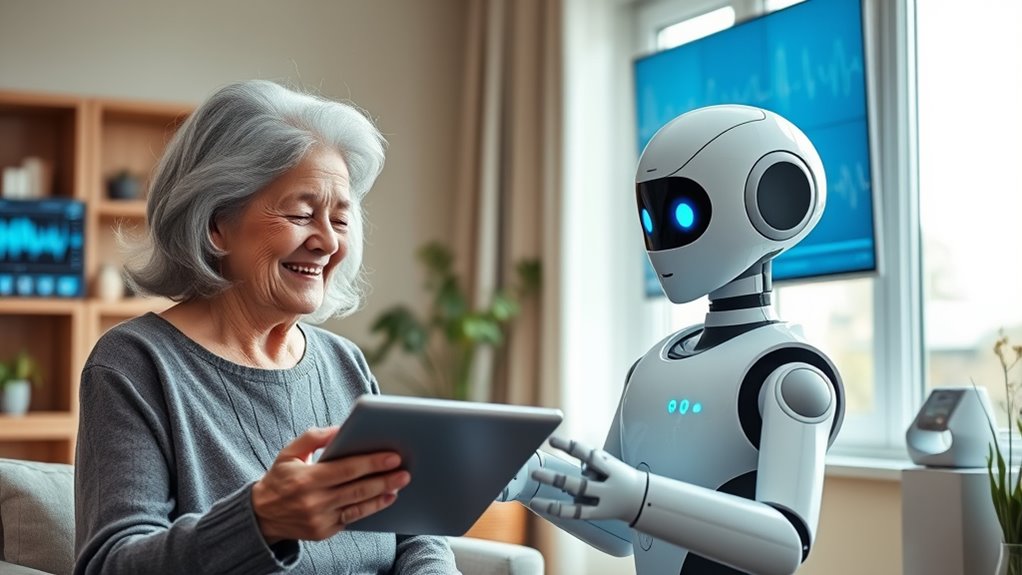
The evolution of AI technologies in senior healthcare has transformed how we monitor and support older adults. Today, AI-powered elder care uses advanced systems that go beyond basic devices, offering predictive analytics, personalized interventions, and emotional support.
Wearables and sensors enable continuous health monitoring, providing early detection of health risks and real-time alerts. Virtual assistants, chatbots, and robotic companions like Paro help improve social engagement and mental wellness. Effective communication is essential in ensuring that older adults feel understood and supported by these technologies. Additionally, the incorporation of evidence-based practices enhances the efficacy of AI interventions in managing chronic conditions. Creating a retirement savings plan is also crucial for older adults, as it ensures financial stability alongside health management. Supporting children through divorce is vital, as it allows families to navigate complex emotional landscapes while maintaining stability.
Machine learning algorithms analyze biodata—such as facial scans and activity patterns—to predict diseases like Alzheimer’s years before symptoms appear. These advancements have also resulted in integrated platforms combining IoT, 5G, and AI, making aging in place more feasible and reducing dependency on institutional care. User privacy and data protection are also critical considerations as these technologies evolve, ensuring that sensitive health information remains secure.
AI’s evolution is reshaping elder care for a healthier, safer aging experience.
Enhancing Medical Monitoring and Emergency Response
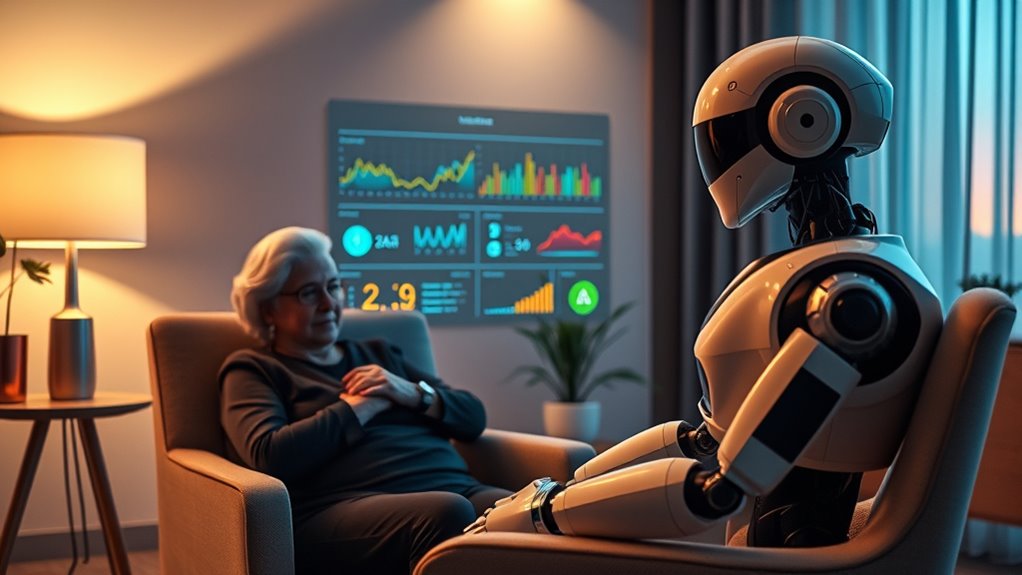
Advances in AI have remarkably improved medical monitoring and emergency response for seniors living independently. With AI-powered remote monitoring, sensors track essential signs, activities, and emotional states continuously, providing real-time insights. Incorporating gentle stretching before bedtime can also aid in maintaining overall physical health, which is crucial for seniors. Additionally, high refresh rates in monitoring devices can enhance the responsiveness of alerts when detecting emergencies. Machine learning algorithms analyze this biodata to predict acute health events like falls, strokes, or cardiac emergencies with high accuracy. Furthermore, understanding Required Minimum Distributions (RMDs) can help seniors manage their financial health alongside their physical well-being. Contactless radar sensors, such as Vayyar’s 4D radar, enable fall detection and movement monitoring without wearable devices, ensuring safety even during sleep. When abnormal patterns or emergencies are detected, AI-driven alert systems automatically notify caregivers or emergency services, allowing for rapid responses. Moreover, the integration of sustainability and eco-friendly design choices in technology can enhance the overall well-being of seniors in their living environments. Additionally, the importance of cybersecurity vulnerabilities during technology outages must be considered to protect sensitive health data.
Supporting Mental Well-Being and Combating Social Isolation
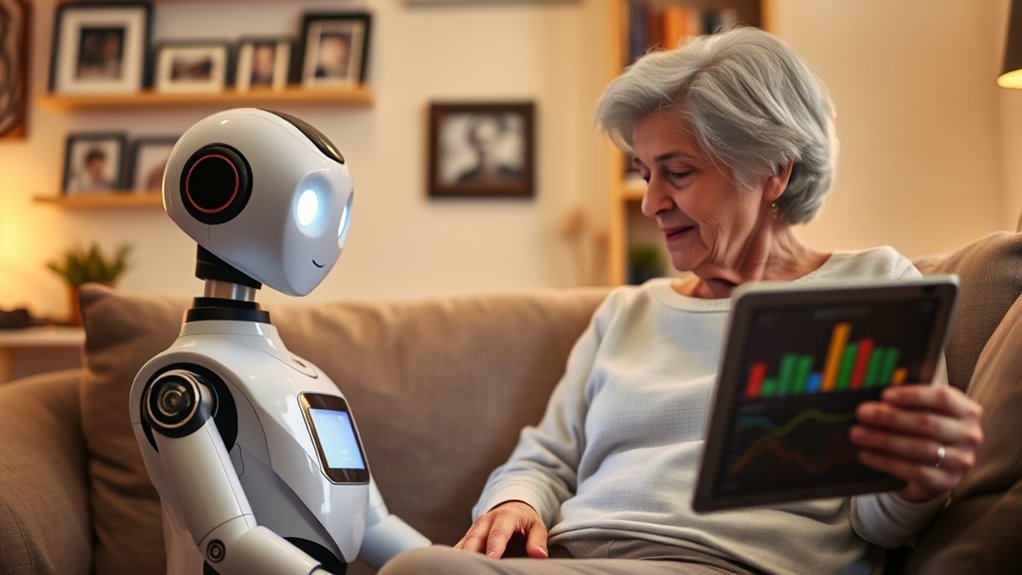
AI-powered virtual companions offer personalized interactions that help reduce loneliness and keep seniors socially engaged. These conversational agents provide emotional support, engaging activities, and cognitive exercises tailored to individual needs. Additionally, they can enhance the overall appearance of the eye area by encouraging users to maintain good eye care habits, such as using eye patches to reduce dark circles and puffiness.
Virtual Companions for Loneliness
Have you ever wondered how technology can ease feelings of loneliness among seniors? Virtual companions, like AI chatbots, offer personalized conversations that provide emotional support, helping seniors feel less isolated. These virtual companions engage elders in meaningful dialogue, promoting mental stimulation and social connection. Additionally, they can provide access to best anime films, which can serve as a delightful escape and foster shared interests among seniors and caregivers. Furthermore, the development of robust safety measures ensures that these AI interactions remain secure and trustworthy. Moreover, incorporating newborn sunscreens into discussions about health and well-being can encourage seniors to share experiences and knowledge with younger generations. The integration of intelligent tutoring systems can also enhance the learning experiences of seniors, allowing them to engage with new topics and technologies.
They also offer activities like games and music, which can reduce boredom and anxiety. By monitoring speech patterns and activity levels, virtual companions can even assess emotional well-being and alert caregivers if needed.
Integrating AI-powered agents into senior care has shown to improve mood, increase social engagement, and foster a sense of connectedness. In fact, the entertainment industry, including WWE Raw’s financial impact, highlights the importance of creating engaging content that resonates with audiences, which is mirrored in the way virtual companions connect with seniors. If you’re seeking ways to support mental well-being, virtual companions are an innovative solution to combat loneliness among seniors.
AI-Driven Emotional Support
Artificial intelligence is transforming how we support seniors’ mental well-being by providing personalized emotional assistance. Virtual assistants and chatbots like Amicus Brain offer tailored conversations that help reduce loneliness and social isolation. This innovation reflects a growing trend towards quaint charm in technology, where user-friendly and delightful experiences are prioritized. Additionally, regular maintenance can extend the life of the canvas materials used in various supportive devices. Somatic therapy techniques, such as breathwork, can also be integrated into these AI tools to enhance emotional regulation and self-awareness. Incorporating elements of textile art into these environments can further promote a comforting atmosphere for seniors.
These AI-driven emotional support tools use natural language processing to engage seniors in meaningful dialogue, games, and information sharing based on their preferences. Robotic companions such as Paro and robotic dogs can effectively alleviate depression and boost mental health by providing consistent, empathetic interaction.
Additionally, AI-enabled music therapy and mood-monitoring systems help ease anxiety, agitation, and emotional distress, especially for those with cognitive impairments. By supplementing human caregiving, these emotional support solutions promote mental well-being and foster a sense of connection in both independent and institutional elder care settings. Moreover, similar to how SeaWorld operating hours vary by season, the availability of these AI tools may also change based on specific circumstances or user needs.
Personalized Cognitive Engagement
Personalized cognitive engagement harnesses AI to support seniors’ mental well-being and combat social isolation by offering tailored activities that stimulate the mind. By analyzing individual preferences and behaviors, AI systems provide personalized care that enhances mental stimulation and promotes elderly wellness. For example, AI-powered virtual assistants can suggest customized games, music therapy, or conversations that adapt to changing mental states. These tools help slow cognitive decline and keep seniors engaged. Additionally, incorporating natural sweetening alternatives like honey into their diet can provide beneficial nutrients that support overall health. Quality sleep enhances cognitive function, which is vital for maintaining mental agility in seniors. Furthermore, fostering community engagement through shared activities can also enhance the sense of belonging among seniors.
Moreover, AI monitors emotional cues through speech and facial expressions, enabling early detection of depression or anxiety. These innovations ensure timely interventions and emotional support, fostering a sense of companionship. Incorporating mindfulness practices within these tailored activities can further enhance emotional stability and focus. Ultimately, personalized cognitive engagement helps seniors maintain mental agility and social connection, enriching their daily lives.
Promoting Independence Through Assistive Devices and Robots

Assistive devices and robots powered by AI help you stay independent by making daily tasks easier and safer. Smart home systems, wearable sensors, and robotic aids support mobility, medication management, and safety monitoring.
These technologies enable you to live confidently while reducing reliance on constant assistance.
Smart Home Integration
How can smart home integration help seniors maintain their independence? AI-powered devices like fall detection sensors, emergency alerts, and voice assistants create a safer, more comfortable environment. These systems use AI integration to monitor activity, detect abnormalities, and respond instantly, reducing risks.
Consider these key benefits:
- Contactless radar sensors monitor activity without wearable devices, boosting safety.
- Automated adjustments for lighting, temperature, and security tailor the home to routines and preferences.
- Continuous essential sign monitoring detects emergencies early, allowing prompt intervention.
Robotic Mobility Assistance
Building on the safety features of smart home integration, robotic mobility assistance devices play a vital role in helping seniors stay independent. These assistive robots, including robotic walkers and exoskeletons, support walking and transfers, especially after injuries or strokes.
AI in senior care enhances these devices with sensors and real-time monitoring, enabling fall detection and personalized support. Robotic gait trainers improve walking speed and stability, making daily tasks easier and safer.
Innovations focus on lightweight, easy-to-operate designs that require minimal training, increasing accessibility. By adapting to individual needs, AI-driven robotic mobility devices empower seniors to maintain independence longer, reducing reliance on caregivers while promoting confidence and safety in mobility tasks.
Medication Management Tools
AI-powered medication management tools are transforming how seniors maintain their independence by simplifying complex routines and reducing errors. These systems use smart reminders and automated dispensers to improve medication adherence, making it easier to stay on track.
Assistive robots equipped with AI monitor medication schedules, alert caregivers of missed doses, and provide real-time support for medication-related tasks.
Machine learning algorithms analyze your health data to personalize care, ensuring the right timing and dosage adjustments.
These tools also detect potential drug interactions or side effects by continuously monitoring your medication intake and health indicators.
Here are three ways they promote independence:
- Simplify medication routines
- Decrease reliance on caregivers
- Enhance safety with personalized care
Personalizing Care With Data-Driven Insights

By analyzing data from sensors, essential signs, and activity patterns, AI enables caregivers to create highly personalized care plans tailored to each senior’s unique needs. This use of data-driven insights helps identify health risks early, allowing proactive interventions that improve outcomes and prevent emergencies. AI algorithms interpret complex biodata to customize medication schedules, enhancing safety and adherence. Personalization in elder care also supports emotional well-being by aligning activities and interactions with seniors’ preferences and histories. Over time, continuous data collection allows AI systems to adapt care strategies dynamically, ensuring responsiveness.
| Data Source | Purpose | Benefit |
|---|---|---|
| Sensors & vital signs | Detect health changes early | Prevents emergencies |
| Activity patterns | Tailors daily routines | Enhances engagement |
| Biodata interpretation | Customizes medication management | Improves safety and adherence |
Ethical Considerations and Privacy Challenges
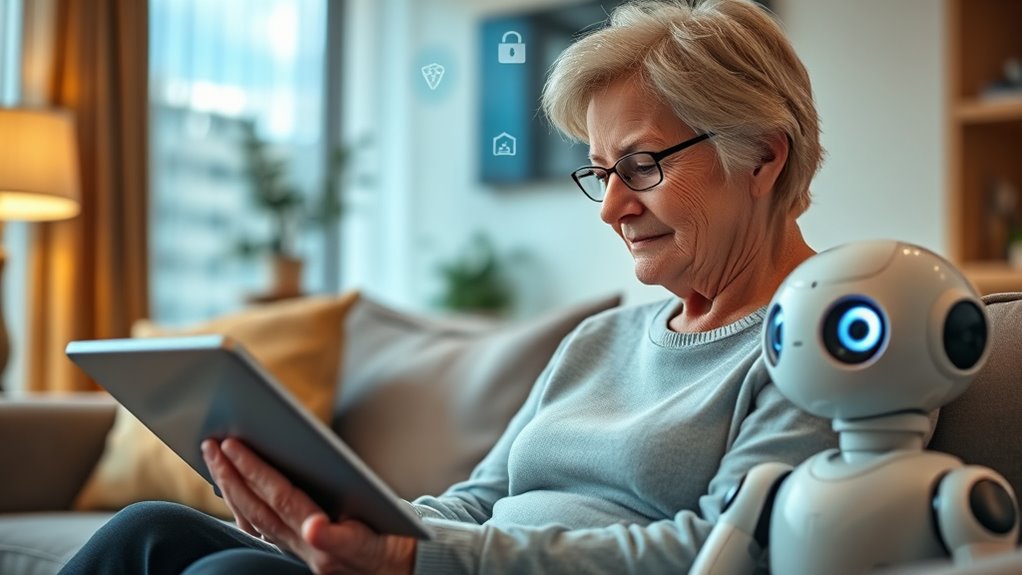
As AI systems collect vast amounts of personal data to tailor elder care, privacy concerns become increasingly prominent. You must consider critical issues like:
- Ensuring data privacy by safeguarding sensitive information against breaches.
- Addressing ethical considerations, such as respecting seniors’ dignity and autonomy.
- Recognizing and mitigating bias in algorithms, which can worsen healthcare inequalities.
Without proper oversight, these challenges risk violating privacy rights and perpetuating discrimination. Limited regulatory frameworks make it essential for developers and caregivers to prioritize ethical practices.
Respecting seniors’ privacy and involving them in the design process can help build trust. Ultimately, balancing technological benefits with ethical considerations is essential to protect older adults and uphold their rights as AI becomes more integrated into elder care.
Improving Caregiver Support and Operational Efficiency
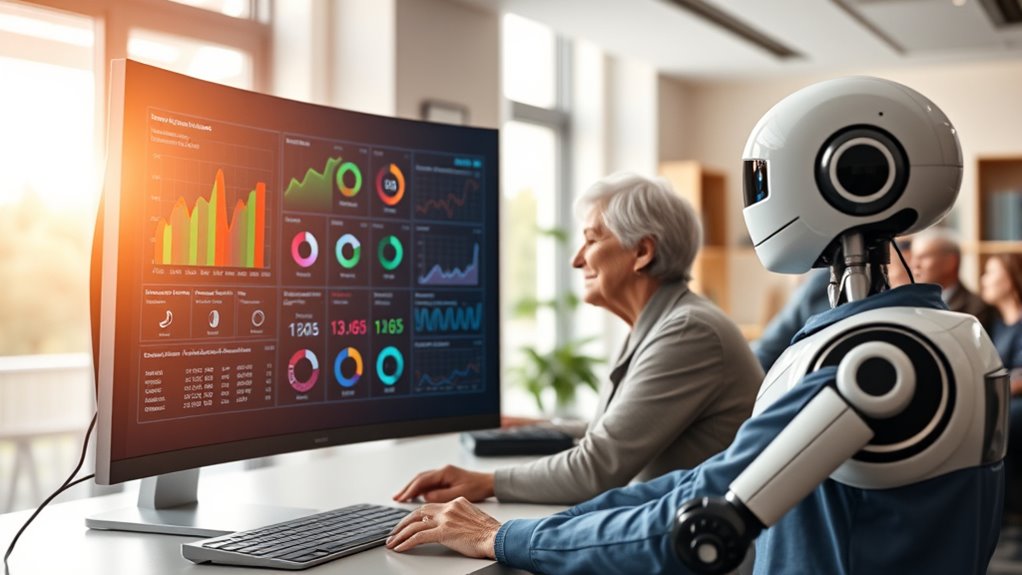
AI tools are transforming elder care by enhancing caregiver support and boosting operational efficiency. You benefit from automation features like automated scheduling and predictive maintenance, which reduce workload and lower costs.
Real-time analytics from systems like Sensi.AI extend your reach by delivering care recommendations and monitoring essential signs, enabling early detection of health issues and reducing emergency interventions.
Virtual assistants support medication management and appointment reminders, helping seniors maintain independence while easing your responsibilities.
Data analytics streamline administrative tasks and optimize resource allocation, allowing you to focus more on providing personalized, compassionate care.
These innovations not only improve the quality of care but also make operations more efficient, ensuring better outcomes for seniors and a more sustainable care environment.
Future Trends and Innovations in Elder Care AI

Future innovations in elder care AI are set to revolutionize how you support seniors, with advanced predictive analytics enabling early detection of conditions like Alzheimer’s up to seven years before symptoms appear. This means you can intervene earlier, improving quality of life for the elderly.
AI in elder care will enable early detection of conditions like Alzheimer’s, transforming support and intervention strategies.
AI solutions will incorporate wearable and contactless sensors that continuously monitor health metrics in real-time without disrupting daily routines.
Additionally, AI-powered virtual companions will become more personalized, providing tailored mental health support and emotional connection.
Integration with smart home systems will enhance safety features like fall prevention, emergency response, and environmental adjustments, helping seniors age in place comfortably.
Key trends include:
- Enhanced predictive analytics for early diagnosis
- Smarter, less intrusive health monitoring
- Ethical AI frameworks prioritizing privacy and autonomy
Addressing Barriers to Adoption and Building Trust

Implementing innovative elder care AI solutions requires more than just technological advancements; it depends heavily on overcoming barriers to adoption and earning seniors’ trust. You can boost acceptance by involving seniors in designing AI tools, making them feel heard and reducing fears. Providing extensive training and ongoing support helps seniors gain confidence and comfort using new technologies. Addressing privacy concerns with transparent data practices and strong security measures builds trust. Showing tangible benefits, like enhanced safety and independence, encourages adoption and reduces resistance. To illustrate, consider the table below:
| Barrier | Solution | Outcome |
|---|---|---|
| Trust and Privacy | Transparent data handling and security | Increased confidence |
| Acceptance | Involving seniors in design | Better usability and acceptance |
| Skepticism | Demonstrating real benefits | Reduced resistance |
| Dignity and Autonomy | Ethical, personalized care practices | Fosters trust and respect |
| Training and Support | Ongoing education | Confident AI use |
Frequently Asked Questions
How Is AI Used in Elderly Care?
You might wonder how AI is used in elderly care. It helps by providing devices like wearables and smart home systems that monitor essential signs, activity, and safety.
Virtual assistants and chatbots offer companionship, reminders, and health advice, keeping seniors independent.
AI also predicts health risks early, supports remote monitoring for quick interventions, and uses robotic pets to reduce loneliness, improving overall well-being and safety for older adults.
How Is AI and Machine Learning Used in Healthcare?
You explore how AI and machine learning revolutionize healthcare by analyzing enormous data, aiding early diagnosis, and customizing treatments. These technologies track essential signs, forecast health risks, and facilitate fast, focused care.
Wearable devices send alerts during emergencies, virtual assistants provide personalized support, and smarter workflows streamline services. Together, they enhance accuracy, reduce costs, and ultimately, improve patient outcomes, making healthcare smarter, safer, and more responsive.
How Is AI Used in Long Term Care?
You see, in long-term care, AI helps by using sensors, wearables, and virtual assistants to keep an eye on seniors’ essential signs, activity, and mood.
It analyzes this data to spot early health issues, like falls or mobility problems, so you can intervene quickly.
AI also provides companionship through robots and chatbots, reducing loneliness, and improves personalized care plans, helping residents stay independent and healthier longer.
What Is the Best AI for the Elderly?
Imagine having a caring companion that adapts perfectly to your needs. The best AI for the elderly combines virtual assistants like Alexa or Google, with health sensors, wearables, and friendly robots, all working seamlessly.
It offers personalized support, monitors health, and keeps you connected, while respecting your privacy. This integrated approach makes daily life easier, safer, and more engaging, ensuring you feel understood, secure, and cared for every step of the way.
Conclusion
As you explore AI’s role in elder care, remember that technology is a tool—it’s how you use it that truly matters. By embracing innovation thoughtfully, you can improve seniors’ quality of life and support caregivers. Don’t forget, “A journey of a thousand miles begins with a single step.” With trust and compassion, you can harness AI’s potential to create a safer, more connected future for our elders.
